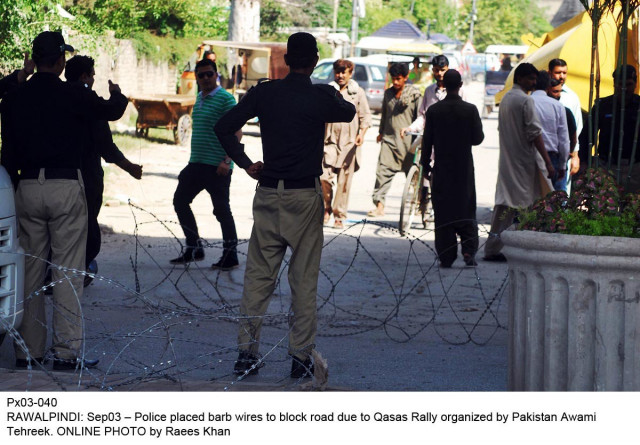370 personnel of Rapid Response Force in final stage of training
Policing culture changing in Islamabad and other federating units

PHOTO: EXPRESS
The recruitment of remaining component is in process, data issued by Interior Division revealed and enumerated steps being taken to improve performance of police and other Law Enforcement Agencies (LEAs) and make the police department public friendly.
According to the document available on the website of the National Assembly, Islamabad Capital Territory (ICT) Police, working under Ministry of Interior, is federal government component of law enforcement in capital and in order to improve its performance and make it more public friendly and service oriented measures have been adopted.
One of the steps was establishment of modern reporting rooms staffed by specially selected and trained personnel in l4 police stations to improve operational capacity through provision of one window service to citizens, read the document submitted in reply of a question by MNA Aisha Syed.
She had asked: “Will the Minister for Interior state the steps being taken by the government to improve the performance of police and other law enforcement agencies and to make the police department public friendly?”
Reception officers and human rights officers have been appointed in police stations to ensure that professionalism is exhibited in handling public issues while a proposal for establishment of modern interrogation rooms is also under consideration.
ICT police are regularly conducting courses and training for capacity building of its officers in Police Training School located at Police Lines.
The courses being run included basic recruit training, lower school, intermediate school and refresher courses while modules and practical policing courses are being arranged in collaboration with United Nations Office on Drugs and Crime (UNODC).
Moreover, the data showed that to help improve morale in force, welfare of personnel was particularly being stressed.
The welfare measures included upgrading of police dispensary in lines, provision of bachelor and family accommodation while package being offered to police martyrs was being further enhanced.
Cash rewards are awarded to efficient officers. A programme titled `Cop of the Month' has been introduced as an encouragement to police personnel, showing extra ordinary performance during each month.
Under government policy, an effort was underway to erase corruption from top to bottom within department and towards this an internal accountability system has been established. A committee headed by a senior officer has been established to initiate departmental proceedings against corrupt personnel within department.
Besides, an online complaint cell was already functional in office of IGP and SSP offices. These offices are electronically connected. Citizens registering, complaints can submit their applications here and the same are being pursued and entertained accordingly.
Enquiries are being held on such applications under relevant provisions of law and delinquent officers are being dealt with departmentally as well as recommended for criminal proceedings to courts of law.
About steps taken to improve public service and attitude, the data showed that four model police stations in City zone, five in Saddar, three in Rural and two in Industrial Area zone have been established with special reporting rooms computers connected with internal network of ICT Police, fax machines, photocopies, telephones, LCDs, air conditioners, CCTV cameras, fire extinguishers, comfortable and sufficient sitting space are available for public convenience.
After establishment of model police stations, performance of police is satisfactory. However, there is always a room for improvement.
Reception officers and human right officers have been appointed to help the public with their problems.
Similarly, in order to ensure positive police-public interaction, ICT Police were focusing on community policing. Various committees with public representation have been established to ensure involvement of citizens in resolution of local issues.
The committees established included Central Citizen Committee, Rescue-15 Committee (RC), Traffic Committee (TC), Citizen Police Coordination Committee at Police Stations (CPCC).
The aims of these committees were to oversee police-public relations, monitor and report irregular and illegal activities in police stations, suggest measures to improve police station culture, probe non-cognisable cases and resolve minor disputes of civil nature.
Moreover, the data revealed that provincial police forces have also taken steps to improve performance and ensure public friendly service within their jurisdictions.
Published in The Express Tribune, October 15th, 2017.



















COMMENTS
Comments are moderated and generally will be posted if they are on-topic and not abusive.
For more information, please see our Comments FAQ